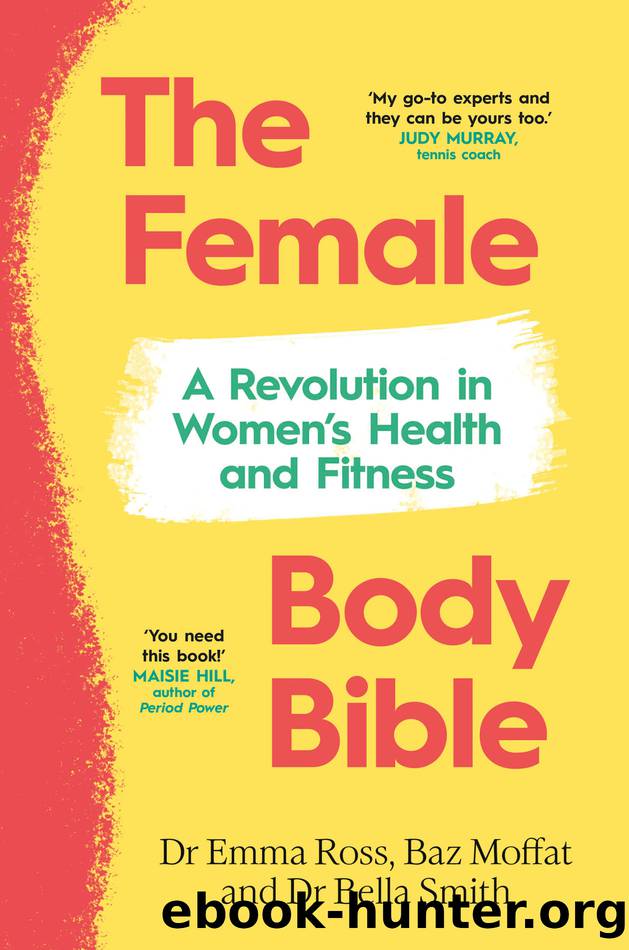The Female Body Bible by Dr Emma Ross & Baz Moffat & Dr Bella Smith

Author:Dr Emma Ross & Baz Moffat & Dr Bella Smith [Ross, Dr Emma & Moffat, Baz & Smith, Dr Bella]
Language: eng
Format: epub
ISBN: 9781529194043
Publisher: Penguin Random House UK
Published: 2023-05-11T00:00:00+00:00
Vegging out
Thereâs no doubt that if you choose to adopt a vegetarian or vegan diet then itâs harder to get the essential macro- and micronutrient supply from your food. Research shows that vegans consume less energy than omnivores and that vegetarian diets generally appear to be lower in protein, fat, vitamin B12, riboflavin, vitamin D, calcium, iron and zinc when compared with an omnivorous diet.62 Thatâs because animal foods really are the best source of protein, zinc, iron, and omega-3s, to name a few, and they are the only source of vitamin B12 (which helps keep the bodyâs nerve and blood cells healthy, helps make DNA â the genetic material in all cells â and, if that wasnât enough, also helps prevent anaemia). Well-considered vegetarian diets can be sufficiently nutritious for health and performance, but the quality and timing of what you eat needs real planning. There must be an emphasis on foods fortified with iron, zinc, calcium and vitamin B12, and possibly supplementation of these key âhot spotsâ for deficiencies. Vegan athletes have been shown to consume less protein than both omnivores and vegetarians. The challenge with plant-based proteins is that they are often incomplete sources of protein, missing important essential amino acids. If youâre vegan, make sure youâre getting good doses of protein through foods like beans, lentils, tofu, nuts, seeds and most grains, including quinoa; and if youâre vegetarian, choose milk, Greek yoghurt, cottage cheese and eggs for your protein. When you suspect that you arenât getting enough calories from a vegan or vegetarian diet, a good strategy is to increase how often you eat and to up your intake of energy-dense foods such as nuts, seeds and oils.
We pass no judgement on being vegan or vegetarian, but we do urge you to acknowledge that this dietary approach can come at a cost, particularly for very active women. Getting regular, quality protein to support training and adaptation, making sure your micronutrient intake supports hormone health and that your overall energy intake is sufficient and not sending you into energy deficit, is more challenging if you are vegan or vegetarian. Despite the hype, there is no evidence that there are performance gains to be had from this approach to eating, and because of the likelihood of undereating on these types of diets, the risk of energy deficiency and its impact on performance may be increased. By being conscientious and organized, you can happily eat lots of nutrient-dense plant-based meals with enough protein, fat and minerals such as zinc and calcium. But being conscientious and organized isnât for everyone, and certainly not for teenagers, who in our experience base their vegetarian diet around cheese and pasta. So if you have adopted or are thinking of adopting this approach, or your teenage daughters/nieces/friends are doing so, then please be diligent in making sure that you fully support your, or their, sport and activities through a well-balanced diet.
Download
This site does not store any files on its server. We only index and link to content provided by other sites. Please contact the content providers to delete copyright contents if any and email us, we'll remove relevant links or contents immediately.
Name Book, The: Over 10,000 Names--Their Meanings, Origins, and Spiritual Significance by Astoria Dorothy(2987)
Tone Your Tummy Type by Denise Austin(2845)
The Ultimate Guide to Anal Sex for Women by Tristan Taormino(2298)
The Coregasm Workout by Debby Herbenick(2272)
The Expectant Father by Armin A. Brott & Jennifer Ash(2270)
The Women's Health Fitness Fix by Jen Ator(2241)
Expecting Better by Emily Oster(2211)
She-ology by Sherry A. Ross MD(2165)
The Hite Report on Shere Hite by Shere Hite(2063)
Woman: An Intimate Geography by Natalie Angier(1939)
8 Steps to Reverse Your PCOS by Fiona McCulloch(1914)
Birth by Tina Cassidy(1903)
The Female Brain by M.D. Louann Brizendine(1899)
101 Get-Lean Workouts and Strategies by Muscle & Fitness(1868)
Women & the Weight Loss Tamasha by Diwekar Rujuta(1801)
50 Ways to Soothe Yourself Without Food by Susan Albers(1791)
The Big Booty Blueprint: Your Guide To A Bigger Butt In Less Than 12 Weeks by Bella Rahbek & Brandon Carter(1671)
The overachievers by Robbins Alexandra(1577)
Unleash the Power of the Female Brain: Supercharging Yours for Better Health, Energy, Mood, Focus, and Sex by Daniel G. Amen M.D(1576)
